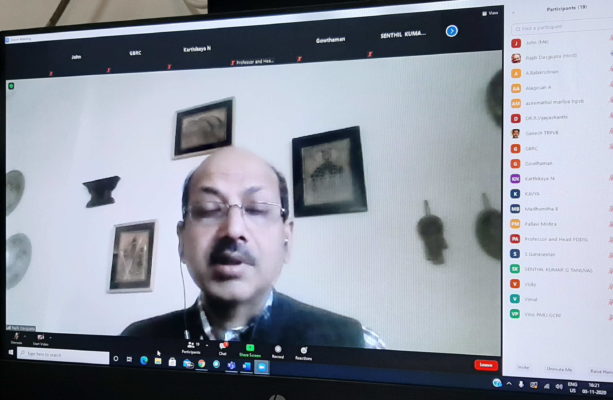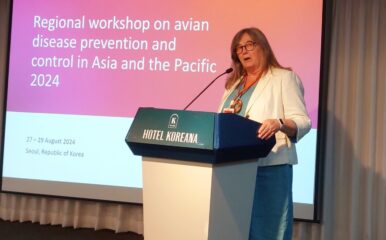
India team talk for One Health Day 2020
Published on 06/11/2020

One Health Poultry Hub co-investigator Professor Rajib Dasgupta delivered an online talk on One Health Day 2020 on the ‘Relevance and challenges of One Health’, using the opportunity to stress the importance of consultative and collaborative leadership to advance the One Health approach.
Professor Dasgupta, professor at the Centre of Social Medicine and Community Health in the School of Social Sciences at Jawaharlal Nehru University, presented on the history of One Health and discussed the concept of ‘One Medicine’ by Rudolf Virchow, who first coined the term ‘zoonosis’ and postulated the idea that there is no dividing line between human and animal health.
Later, in 1947, James Steele founded the Veterinary Public Health division at The Centers for Disease Control and Prevention (CDC). From there on, advocacy around bridging the gap between human and veterinary public health to address zoonotic diseases was strengthened.
Professor Dasgupta also spoke on the association between the Society for Tropical Veterinary Medicine and the Wildlife Disease Association to promote the idea of One Health towards the end of the 20th century, and he described how, earlier this century, the Pilanesberg Resolution was passed to foster conservation and ensure development outcomes at the interface between wildlife, livestock and human health. Similarly, in 2006, the Manhattan Principles also promoted the idea of ‘One Health, One World’.
Sustainable Development Goals
While speaking about the health goals under the Sustainable Development Goals (SDGs), Professor Dasgupta highlighted that the majority of the health goals under the SDGs require multi-sectoral partnership. The Alma Ata Declaration of 1978 also underscores the importance of multi-sectoral collaboration to achieve health for all.
Multi-sectoral collaboration for health, he said, involves the activities of non-health sectors which could potentially improve health. He said the role of the health sector was as a ‘minimal actor’ in a context in which other sectors play a dominant role and can have a determining influence on health.
The health sector can also play the role of ‘supporting actor’ to address structural forces and social norms which affect all society, he said. As a bilateral or trilateral partner, the health sector can play a crucial role in producing co-benefits and furthering health benefits. It also plays a lead role in delivering a core mandate through collaboration with other sectors.
Professor Dasgupta emphasised the importance of the collaboration between disciplines and analytical approaches to achieve the goal of One Health. This goal can be achieved through multidisciplinary approaches and multi-sectoral partnerships in policy and governance.
Partnership roles
Multi-sectoral partnerships for One Health also require working with different ministries while navigating through tacit institutional hierarchies and providing a leadership role for health issues. It is important, said Professor Dasgupta, to build capacities across sectors and government institution to foster the goal of One Health.
He added that the priority for health sector leadership should be negotiation, flexibility, learning, communication and relationship building. In this collaborative process, non-governmental actors, including civil society, academia, private sector and funding agencies can be made aware of their respective roles.
A culture of mutual learning can also be cultivated among divergent stakeholders. Professor Dasgupta illustrated the example of the National Expert Group on One Health by the Department of Biotechnology, Government of India, a trans-disciplinary collaboration for One Health in India.
Professor Dasgupta concluded his talk by emphasising the importance of consultative and collaborative leadership to promote innovation, adaptation and flexibility in terms of political, financial and administrative accountability and achieve the goals of One Health.


